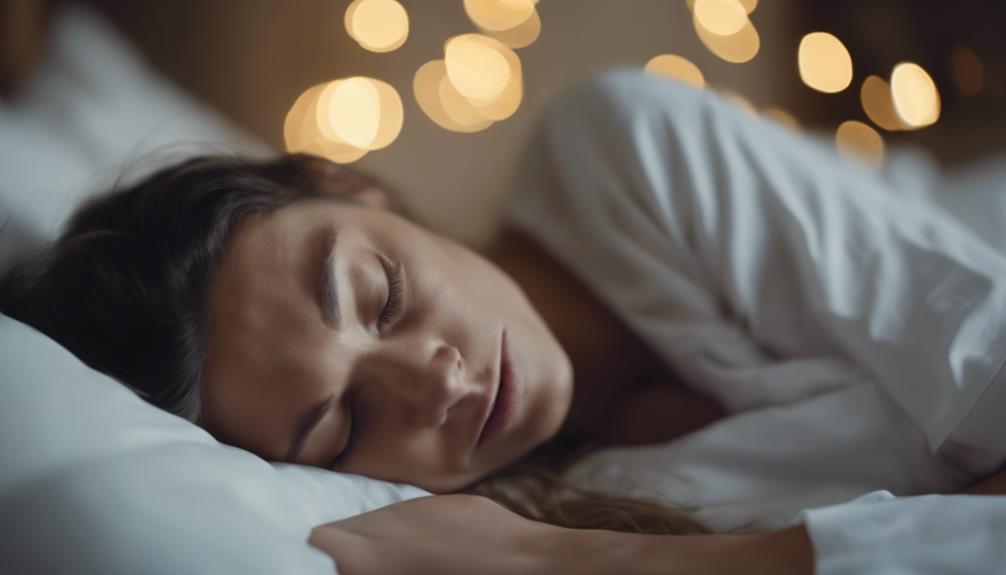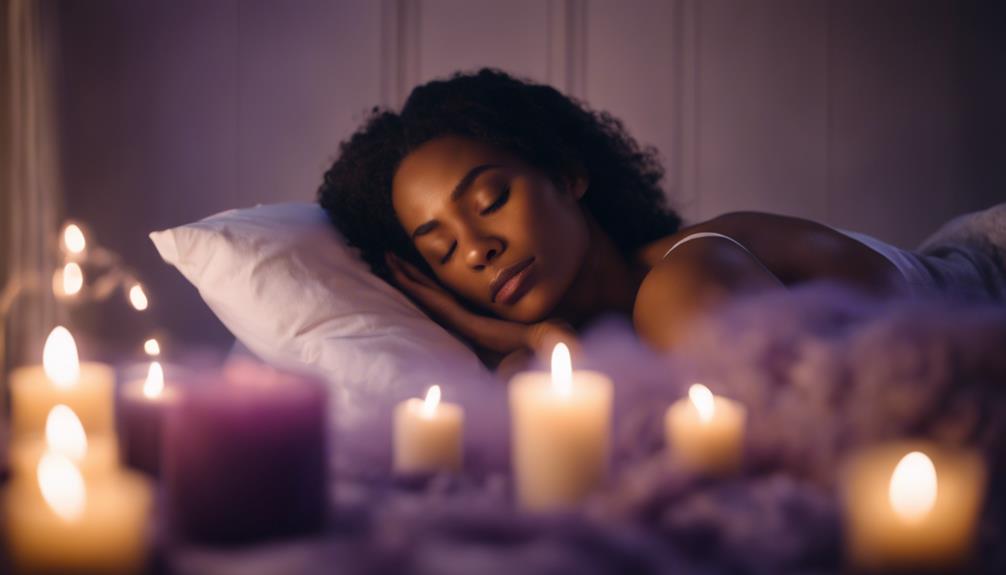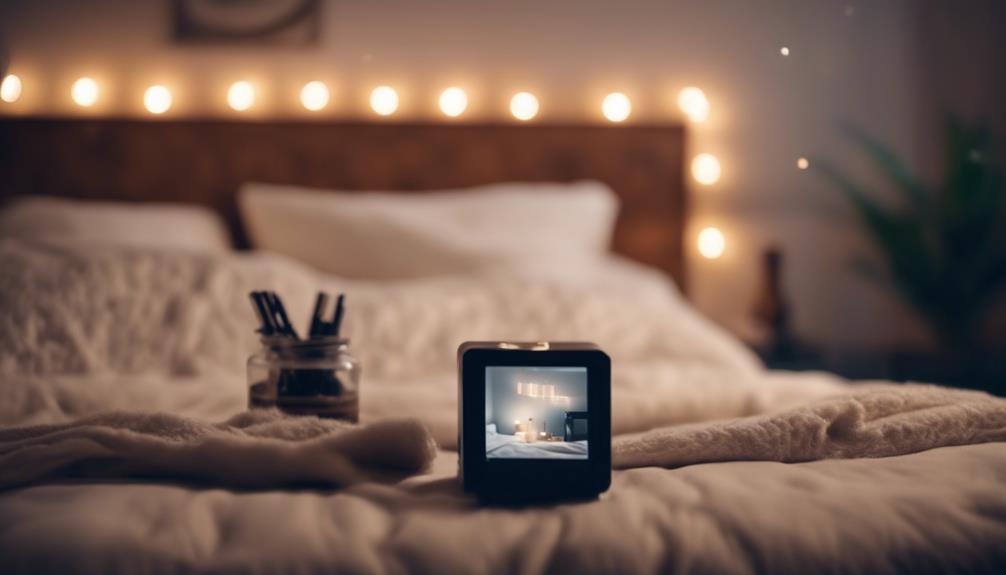
Achieve deeper sleep with powerful hypnotherapy techniques. Hypnotherapy accesses the subconscious to tackle root causes of insomnia, offering a drug-free approach for lasting results. Here are techniques for deeper sleep; Guided imagery induces calmness through visualization and reduces anxiety, aiding in sleep preparation. Progressive muscle relaxation reduces tension, enhancing relaxation with deep breathing.
Self-hypnosis techniques promote relaxation, mindfulness, and stress relief for improved sleep. Establishing a bedtime routine with hypnosis creates an environment conducive to quality rest. Explore these techniques for enhanced sleep quality and address insomnia effectively.
Key Takeaways
- Guided imagery induces deep relaxation for better sleep quality.
- Progressive muscle relaxation reduces tension and promotes restful sleep.
- Self-hypnosis aids in calming the mind for deeper sleep.
- Mindfulness meditation enhances present-moment awareness for improved rest.
- Creating a bedtime routine with hypnosis techniques optimizes sleep.
Benefits of Hypnotherapy for Sleep
Hypnotherapy offers a range of benefits for improving sleep quality and addressing insomnia-related issues. Sleep disorders, such as insomnia, can significantly impact an individual’s overall well-being and daily functioning. Through hypnotherapy, individuals experiencing difficulties with sleep can explore alternative treatments beyond traditional methods.
Insomnia treatments often involve medication or cognitive-behavioral therapy. However, hypnotherapy presents a non-invasive and drug-free approach to addressing sleep disturbances. By accessing the subconscious mind, hypnotherapy can help individuals identify and address underlying issues that may be contributing to their insomnia. This personalized approach can lead to long-lasting improvements in sleep quality and duration.
Furthermore, hypnotherapy can aid in reducing anxiety and stress levels, common culprits of sleep disorders. By promoting relaxation and mental clarity, hypnotherapy equips individuals with tools to calm their minds and bodies before bedtime, fostering a conducive environment for restful sleep.
Guided Imagery Techniques

How can guided imagery techniques enhance the effectiveness of addressing sleep disturbances and promoting relaxation?
Guided imagery involves visualization exercises that aim to bring about deep relaxation and mental calmness. By using calming visualizations, individuals can create a mental image that promotes a sense of peace and tranquility, making it an effective tool for inducing sleep.
During guided imagery sessions, individuals are guided to imagine serene scenes, such as a peaceful beach or a tranquil forest, allowing them to escape from stress and worries. These calming visualizations help in quieting the mind, reducing anxiety levels, and preparing the body for sleep induction.
Through the power of imagination, guided imagery can create a harmonious environment within the mind, promoting deep relaxation that is conducive to falling asleep.
Incorporating guided imagery techniques into a bedtime routine can notably improve sleep quality by calming the mind and body, making it easier to drift off into a restful slumber.
Progressive Muscle Relaxation

Progressive Muscle Relaxation is a widely practiced technique for promoting deep relaxation and reducing muscle tension in the body. This method involves tensing specific muscle groups for a few seconds and then releasing the tension, leading to a sense of relaxation. Incorporating deep breathing techniques can further enhance the relaxation process.
By combining deep breathing with the muscle tensing and releasing, individuals can deepen their state of relaxation and promote better sleep. Visualization techniques can also be integrated into Progressive Muscle Relaxation to increase its effectiveness. As you tense and release each muscle group, visualize the tension leaving your body and being replaced by a wave of calmness and relaxation.
This mental imagery can help calm the mind and body, preparing you for a restful night’s sleep. By practicing Progressive Muscle Relaxation with deep breathing and visualization, individuals can effectively reduce stress, anxiety, and muscle tension, ultimately improving the quality of their sleep.
Self-Hypnosis Tips for Better Sleep

For individuals seeking to enhance their sleep quality through self-guided relaxation techniques, exploring self-hypnosis can offer a promising avenue for achieving deeper and more restful sleep. Self-hypnosis involves inducing a state of focused attention and heightened suggestibility to promote relaxation and positive changes in behavior or thought patterns.
When it comes to improving sleep through self-hypnosis, incorporating visualization techniques can be highly effective. By visualizing calm and peaceful scenes, individuals can help quiet the mind and prepare the body for rest.
Additionally, relaxation exercises such as progressive muscle relaxation can further aid in releasing physical tension and promoting deep relaxation before sleep.
Mindfulness meditation is another powerful tool that can be integrated into self-hypnosis practices. By cultivating present-moment awareness and acceptance, individuals can let go of stress and worries that may interfere with falling asleep.
Deep breathing techniques, such as diaphragmatic breathing, can also be beneficial in calming the nervous system and promoting a state of relaxation conducive to sleep.
Creating a Bedtime Routine for Hypnosis

Establishing a structured bedtime regimen that incorporates hypnosis techniques can greatly enhance the quality of your sleep and promote relaxation. To create an ideal environment for hypnosis and improve your sleep quality, it is essential to set the stage for a peaceful shift to bedtime. Begin by ensuring your bedroom is a calming environment, free of distractions and conducive to sleep. Dim the lights, play soothing music, and adjust the room temperature to a comfortable level.
Incorporating bedtime affirmations into your regimen can further enhance the effectiveness of hypnosis for better sleep. Before going to bed, take a few moments to practice positive affirmations related to sleep and relaxation. Repeat phrases such as ‘I am calm and at peace,’ or ‘My mind and body are ready for restful sleep.’ By focusing on these affirmations, you can calm your mind, reduce anxiety, and prepare yourself for a deep and rejuvenating sleep experience.
Embracing a bedtime regimen that combines hypnosis techniques with a calming environment and bedtime affirmations can greatly improve your sleep quality and overall well-being.
Frequently Asked Questions
Can Hypnotherapy Be Used to Treat Sleep Disorders Like Sleep Apnea?
Hypnotherapy can indeed be a valuable tool in managing sleep apnea. As an alternative therapy, it has shown efficacy in addressing sleep disorders by promoting relaxation and addressing underlying issues that may contribute to disrupted sleep patterns.
Are There Any Potential Side Effects of Using Hypnotherapy for Sleep?
When considering hypnotherapy risks for improving sleep quality, it’s crucial to acknowledge potential side effects such as grogginess, vivid dreams, or temporary disorientation. Understanding these possibilities can help mitigate concerns and optimize treatment outcomes.
How Long Does It Usually Take to See Results From Hypnotherapy for Sleep?
Improvements in sleep quality through hypnotherapy can vary based on individual factors such as receptiveness and the nature of sleep patterns. Typically, noticeable changes in sleep patterns and effectiveness of hypnotherapy may be observed within a few sessions.
Can Hypnotherapy Help With Recurring Nightmares or Night Terrors?
Like a gentle lighthouse guiding lost ships, hypnotherapy can illuminate the dark waters of recurring nightmares and night terrors, offering a path to inner peace and restful nights through the power of hypnotic techniques.
Is It Safe to Combine Hypnotherapy With Medication for Sleep?
When considering the combination of hypnotherapy with sleep medication, it’s crucial to prioritize safety. Consult with a healthcare professional to guarantee the effectiveness of this combination therapy while minimizing any potential medication interactions.
Conclusion
To sum up, harnessing the power of hypnotherapy for deeper sleep can be a transformative experience, guiding you into a state of relaxation and tranquility.
By utilizing techniques such as guided imagery, progressive muscle relaxation, and self-hypnosis, you can create a bedtime routine that promotes restful and rejuvenating sleep.
Embrace the soothing embrace of hypnosis and open the gateway to a peaceful night’s rest, allowing your mind and body to drift into a serene dreamland.
Harnessing the power of hypnotherapy for deeper sleep can be a transformative experience, guiding you into a state of relaxation and tranquility. Utilize techniques like guided imagery, progressive muscle relaxation, and self-hypnosis to create a bedtime routine that promotes restful and rejuvenating sleep. Embrace the soothing embrace of hypnosis and open the gateway to a peaceful night’s rest, allowing your mind and body to drift into a serene dreamland.

Take the Next Step, Make An Appointment
Do not be afraid to reach out to me, Mark , to assist you in any issues you might have. Need a good listener or someone to confidentially talk too? . Life Coaching is 45 minute session, once a week.
Self-Hypnosis is taught in one session, individual sessions or in a group, and lasts a lifetime. Most Hypnotherapy sessions including Age regression last 2 hours and EFT Sessions are usually handled with a one hour session
To make an appointment, first listen to the Pre-talk and fill out the Complementary Healthcare Provider Disclosure. The use the Contact Form to request an appointment with, Mark, The Bohol Hypnosis Expert.
Self-help downloads are available to help you with specific problems. The self-hypnosis program to teach you how to self-hypnotize yourself is available here.





